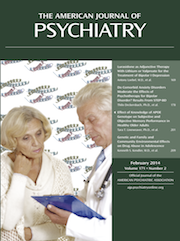Do Comorbid Anxiety Disorders Moderate the Effects of Psychotherapy for Bipolar Disorder? Results From STEP-BD
Abstract
Objective
At least 50% of individuals with bipolar disorder have a lifetime anxiety disorder. Individuals with both bipolar disorder and a co-occurring anxiety disorder experience longer illness duration, greater illness severity, and poorer treatment response. The study explored whether comorbid lifetime anxiety in bipolar patients moderates psychotherapy treatment outcome.
Method
In the Systematic Treatment Enhancement Program randomized controlled trial of psychotherapy for bipolar depression, participants received up to 30 sessions of intensive psychotherapy (family-focused therapy, interpersonal and social rhythm therapy, or cognitive-behavioral therapy) or collaborative care, a three-session comparison treatment, plus pharmacotherapy. Using the number needed to treat, we computed effect sizes to analyze the relationship between lifetime anxiety disorders and rates of recovery across treatment groups after 1 year.
Results
A total of 269 patients (113 women) with a comorbid lifetime anxiety disorder (N=177) or without a comorbid lifetime anxiety disorder (N=92) were included in the analysis. Participants with a lifetime anxiety disorder were more likely to recover with psychotherapy than with collaborative care (66% compared with 49% recovered over 1 year; number needed to treat=5.88, small to medium effect). For patients without a lifetime anxiety disorder, there was no difference between rates of recovery in psychotherapy compared with collaborative care (64% compared with 62% recovered; number needed to treat=50, small effect). Participants with one lifetime anxiety disorder were likely to benefit from intensive psychotherapy compared with collaborative care (84% compared with 53% recovered; number needed to treat=3.22, medium to large effect), whereas patients with multiple anxiety disorders exhibited no difference in response to the two treatments (54% compared with 46% recovered; number needed to treat=12.5, small effect).
Conclusions
Depressed patients with bipolar disorder and comorbid anxiety may be in particular need of additional psychotherapy for treating acute depression. These results need to be replicated in studies that stratify bipolar patients to treatments based on their anxiety comorbidity status.



